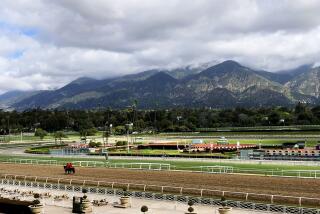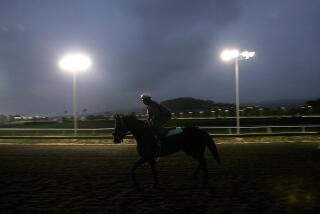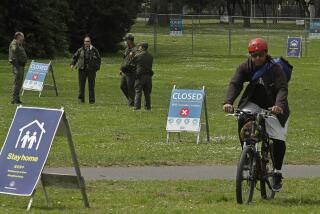Auto Races Scaled Down; Del Mar Still Not Happy
DEL MAR — Facing time pressures and scrutiny from the community, promoters of a Grand Prix-style auto race scheduled to take place at the Del Mar Fairgrounds this fall said Tuesday that they are scaling down the event from 10 days to three.
Jim Michaelian, vice president of the Long Beach Grand Prix Assn., said “time constraints,” caused largely by a lawsuit the City of Del Mar filed in an effort to block the event, make it impossible for promoters to present the more lengthy program of races and special events.
“We are about 60 to 90 days behind where we should be in terms of lining up sponsors, selling tickets and obtaining financial involvement,” Michaelian said in a telephone interview from Long Beach. “Given that, we believe it necessary to restructure the event to make it consistent with our philosophy of providing a quality program.”
Michaelian said the decision reflects a desire to “make this first Grand Prix a positive experience for Del Mar” and ensure that skeptical local residents, who fear that noise from the powerful race cars will disrupt their lives, “invite us back.” The promoters are still planning to put on a full 10-day program in 1987.
The promoters’ action, however, is not likely to spark cheers among local residents. Although the list of events has been thinned, the high-speed sports car race--which triggered the greatest opposition--will go on as planned Nov. 8, 9 and 10.
Scratched from the program were three days of vintage auto racing, numerous charitable events and displays in the fairgrounds’ exposition hall--none of which seemed to bother local residents.
“Basically, we cut the old, slow, quiet cars and kept the new, fast, hot cars,” Michaelian said.
Del Mar officials did not view the decision to reduce the scope of the event as a victory.
“From their point of view, scaling it down is the proper thing to do if they feel time pressure,” Mayor Lew Hopkins said. “But, personally, I was hoping for the full 10 days so we could assess the total impact of the event on our community. As it is, we’ll only be feeling a part of the impact.”
Controversy over the Grand Prix surfaced earlier this year when the Del Mar Fair Board approved a five-year lease to hold the event annually on a temporary track at the fairgrounds. Fair board members characterized it as an appropriate use of the state facility and a way to generate revenue--as much as $100,000 a year, according to race promoters.
But Del Mar leaders and residents criticized the plan, saying auto racing is incongruous with the peaceful character of their seaside community. In an effort to block the race, the city challenged the adequacy of an environmental impact report on the event and filed a lawsuit against the 22nd District Agricultural Assn., as the fair board is formally known.
That action sparked a period of tense relations between the two entities, with the fair board threatening to secede from the city and establish its own special district. Such talk rattled tiny Del Mar, which relies heavily on the fairgrounds for income.
On Aug. 8, the same day the legal challenge was scheduled for a hearing in San Diego Superior Court, the two parties reached an accord. The fair board agreed to stop talking about deannexation and the city agreed to suspend its lawsuit. The parties formed a committee to iron out issues of mutual concern.
Key to the agreement is just how loud the auto race will be and how effectively promoters can control the noise. The California Coastal Commission has established a list of conditions that must be met, and sponsors are required to return to the commission for a review before receiving a permit for next year.
The city’s lawsuit has been suspended--rather than withdrawn--pending an evaluation of the first race program.
“The first year is a critical year, and we want to minimize the negative impacts and maximize the positive,” Michaelian said.
He added that cutting the number of events is not likely to hurt revenues, because most people come for the high-speed Grand Prix race, which will draw about 75 drivers on the professional racing circuit.
More to Read
Sign up for Essential California
The most important California stories and recommendations in your inbox every morning.
You may occasionally receive promotional content from the Los Angeles Times.










